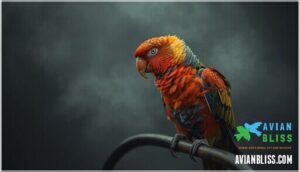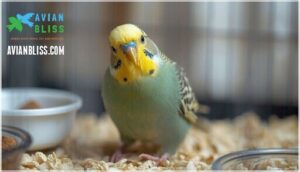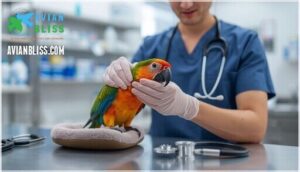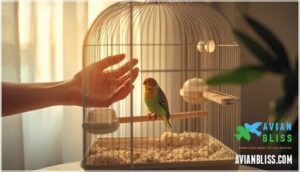This site is supported by our readers. We may earn a commission, at no cost to you, if you purchase through links.
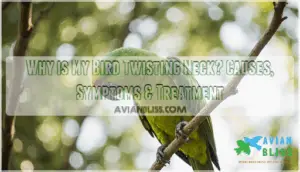
Most neck twisting stems from treatable causes like vitamin E deficiency or minor head injuries, but some cases point to infections or toxicity that need immediate veterinary attention.
Understanding what triggers this symptom and how to respond gives you the power to help your bird recover faster and prevent future episodes.
Table Of Contents
- Key Takeaways
- Common Causes of Neck Twisting in Birds
- Recognizing Symptoms of a Twisted Neck
- Wry Neck: a Specific Form of Neck Twisting
- Diagnosing The Underlying Cause of Neck Twisting
- Treatment Options for Birds With Twisted Necks
- Home Care for Birds With Neck Twisting
- Preventing Neck Twisting in Birds
- Frequently Asked Questions (FAQs)
- What happens if a bird’s neck twists?
- Why is my pigeon’s neck twisting unnaturally?
- Why do birds have a wry neck?
- Why does my Chick’s neck twist backwards?
- Why does my chicken have a wry neck?
- How do you treat a bird with a twisted neck?
- Why do birds rotate their necks?
- Why do parrots twist their necks?
- Why is my bird shaking its neck?
- Can neck twisting in birds resolve on its own?
- Conclusion
Key Takeaways
- Neck twisting in birds stems from treatable causes like vitamin E deficiency or head trauma, but it can also signal serious infections or toxicity that need immediate veterinary attention to prevent permanent nerve damage.
- Early warning signs include persistent head tilting, falling off perches, difficulty flying, reduced activity, and tremors—symptoms that shouldn’t be ignored since prompt treatment within the first week boosts recovery rates to 70–90%.
- Treatment depends on the underlying cause and ranges from vitamin E supplementation and dietary changes for nutritional deficiencies to antibiotics for infections, chelation therapy for heavy metal poisoning, or physical therapy for trauma cases.
- Prevention focuses on providing a balanced diet with essential vitamins and minerals, bird-proofing your home to eliminate toxins and collision hazards, minimizing stress through routine stability, and scheduling annual veterinary check-ups to catch problems early.
Common Causes of Neck Twisting in Birds
When your bird’s neck starts twisting, it’s natural to feel worried and want answers fast. The good news is that several identifiable causes can explain this behavior, and many are treatable when caught early.
Let’s look at the most common reasons why birds develop neck twisting so you know what to watch for.
Vitamin E Deficiency
If your bird’s neck is twisting, don’t overlook vitamin E deficiency—a sneaky cause behind wry neck and other neurological troubles. This nutrient’s antioxidant properties protect nerves and muscles. Birds lacking vitamin E face Encephalomalacia risks, muscle spasms, and poor coordination. A deficiency can also lead to reduced hatchability of eggs.
Fresh greens and proper supplementation levels can help prevent deficiency syndromes and keep your feathered friend steady.
Injuries or Trauma to Head and Neck
If your bird’s neck is twisting, don’t underestimate the impact of trauma. Collision injuries, falls, or getting caught in cage bars can lead to spinal trauma, nerve damage, or muscle injury. Head trauma often triggers sudden tilting or loss of balance. Birds can even suffer severe neck injuries from garden netting risks.
Watch for these three warning signs:
- Sudden head tilting
- Trouble perching
- Reduced activity
Infections Affecting The Nervous System
Just as trauma can twist a neck, infections affecting the nervous system—like viral encephalitis, Newcastle disease, or Bornavirus infections—can wreak havoc too.
Neurological disorders from bacterial infections or cross-species influenza often show up as sudden head tilting, tremors, or loss of coordination. If you notice these signs, suspect an infection targeting your bird’s nervous system.
Heavy Metal Toxicity
Sometimes, neck twisting is the tip of the iceberg for heavy metal toxicity. Urban exposure means your bird might pick up lead poisoning or zinc toxicosis from everyday surroundings. Metal accumulation in tissues can spark neurological symptoms—think head tilting or weakness. Chelation therapy helps, but catching toxins early is key. Watch for these warning signs:
- Sudden weakness
- Greenish droppings
- Poor coordination
Neurological Disorders
When you notice neck twisting, neurological disorders are often the culprit. Viral encephalitis, neurotoxins, or genetic disorders can damage the nervous system, leading to wobbly movements or head tilting. Brain lesions and spinal trauma also play a role.
Birds with neurological issues may show loss of coordination, tremors, or sudden changes in behavior—signs worth a vet’s attention.
Stress and Environmental Factors
Even in a safe environment, stress can sneak in through noise pollution, harsh lighting, or cramped cages. Captivity stress and temperature extremes chip away at your bird’s comfort, sometimes twisting more than just its mood. Social stressors—like isolation or overcrowding—raise anxiety.
Environmental enrichment and stress reduction aren’t just luxuries; they’re essential for neck health.
Genetic Predisposition
Regarding neck twisting, genetic predisposition is a major player. Your bird might inherit certain vulnerabilities, especially with selective breeding or inbreeding. These genetic factors can show up as:
- Inheritance Patterns linked to recessive genes
- Genetic Mutations causing neurological disorders
- Breed-specific genetic conditions
- Poor Breeding Strategies increasing risk of genetic disorder
Recognizing Symptoms of a Twisted Neck
Spotting neck twisting in your bird can be tricky if you don’t know what to look for. Certain signs tend to show up first and can give you a clue that something’s wrong.
Here’s what you’ll want to watch for next.
Head Tilting and Falling
Ever watched your bird tip its head or stumble as if the world’s spinning sideways? That’s often the Vestibular System crying out. Head tilting and falling signal balance impairment, sometimes from cerebellar damage, toxin exposure, or trauma triggers. These symptoms of a twisted neck mean your bird’s equilibrium is off—like walking on a ship in a storm.
| Symptom | Possible Cause | Emotional Impact |
|---|---|---|
| Head Tilting | Vestibular System | Worry |
| Falling | Trauma Triggers | Alarm |
| Weaving | Toxin Exposure | Concern |
Difficulty Flying or Perching
Struggling to fly or perch is more than clumsiness—it’s a red flag for deeper problems like ataxia symptoms or muscle atrophy. You might see your bird miss landings, tremble, or show perch instability.
Coordination issues from wry neck, head tilting, or neurological issues can cause flight limitations. When these signs appear, an avian vet’s expertise is essential.
Reduced Activity and Lethargy
When your bird’s energy levels drop and it seems more interested in sitting quietly than exploring, that’s a clinical sign you can’t ignore. Reduced activity, appetite loss, or sudden behavioral changes often point to underlying conditions—nutritional issues, stress indicators, or infections.
Anorexia and lethargy are early symptoms; a veterinary assessment is key to uncovering what’s really going on.
Wry Neck: a Specific Form of Neck Twisting
Wry neck is a unique type of neck twisting that can look alarming but has its own causes and care needs. If your bird is showing signs of wry neck, choosing the right enclosure can make a big difference in its comfort and safety.
Let’s look at some options that work well for birds dealing with this condition.
Definition and Characteristics of Wry Neck
Imagine your parrot tilting its head skyward, almost as if it’s stargazing—that’s wry neck, or torticollis. This twisted neck posture comes from neuromuscular miscommunication, often causing dramatic axial distortion.
Signs of twisted neck include head tilting and odd movements. Vestibular impairment is usually involved, making balance tricky and leaving your bird looking out of sync with its surroundings.
Differences Between Wry Neck and Other Neck Issues
Now, here’s where things get a bit tricky—wry neck isn’t just another stiff neck. True wry neck stems from neurological dysfunction, not simple muscle strain. You’ll see uncontrolled twisting to one side, often with tremors and poor coordination.
Diagnostic differentiation matters because muscular issues heal in days with rest, while neurological causes like vitamin E deficiency persist for weeks. Etiological variations include infections, trauma, or toxins—each demands different treatment.
Prognostic factors hinge on quick diagnosis: nutritional wry neck shows an 80% recovery rate with prompt supplements, but delayed treatment worsens outcomes considerably.
Breeds Most Susceptible to Wry Neck
Certain chicken breeds carry a considerably higher risk—ornamental birds like Silkie chickens and Polish breeds experience wry neck up to three times more often than standard backyard chickens. Their vaulted skulls leave them vulnerable to head trauma, which can trigger neurological complications.
Coturnix quail face breed-specific challenges too. Tuxedo quail show wry neck in about 3.2% of birds, while White quail register only 0.1%, pointing to genetic factors at work.
Age matters considerably: chicks under six weeks are several times more susceptible than adults, whether from nutritional gaps or congenital conditions. Parrots can develop wry neck too, though ornamental breeds dominate research on species susceptibility.
Long-term Prognosis for Birds With Wry Neck
The bird you care about can absolutely bounce back, but the outcome hinges on what caused the wry neck in the first place. Chickens treated promptly for vitamin deficiency recover 70–90% of the time when you act within the first week. Delay treatment beyond two weeks, and recovery drops to about 40%. Trauma cases need extended rehabilitation, with roughly half achieving partial recovery. Infections involving the nervous system carry tougher odds—under 40% recover fully due to permanent nerve damage.
Even chronic wry neck doesn’t mean the end of a good life. Birds adapt remarkably well with supportive therapy like assisted feeding and modified perches. After three to four months, many show activity levels comparable to healthy flockmates. Physical therapy under veterinary guidance boosts full recovery from near zero to 80% in some cases.
Even chronic wry neck doesn’t spell disaster—birds adapt remarkably well with supportive care, often matching healthy flockmates’ activity levels within months
Here’s what long-term survival looks like:
- Most birds stabilize after six months, with 70% showing no further decline
- Quality of life stays strong when you provide low feeders and stable perching options
- Relapse prevention works—proper nutrition (vitamin E, selenium) prevents recurrence in 90% of recovered birds
- Mild motor issues persist in 60% of chronic cases but won’t stop daily functioning
Long-term prognosis improves dramatically with consistent veterinary monitoring and environmental stability. Keep stress low, nutrition high, and watch your bird thrive.
Diagnosing The Underlying Cause of Neck Twisting
When your bird shows signs of neck twisting, getting a proper diagnosis is the first step toward helping them recover.
Your avian vet will use several methods to pinpoint what’s causing the problem. Here’s what to expect during the diagnostic process.
Physical Examination by an Avian Veterinarian
When your bird’s neck starts twisting, an avian veterinarian becomes your detective, using specialized exam techniques to crack the case. The physical examination follows a systematic approach—starting with distant observation before any handling occurs. Here’s what happens during veterinary assessment:
- System evaluation begins: Your vet checks eyes, beak, heart, and breathing patterns using tools like pediatric stethoscopes and headlamps.
- Neurological issues get tested: Wing extension, leg flexion, and grip strength reveal problems with balance or coordination.
- Hydration assessment matters: Examining mucous membranes and capillary refill time helps detect underlying health problems.
Most exams wrap up in under 10 minutes—quick enough to avoid stressing your bird. This early detection through careful recordkeeping sets the stage for diagnostic tests that’ll pinpoint exactly what’s causing that twist.
Blood Tests and Nutritional Assessments
Your vet will run targeted blood tests to uncover what’s driving that neck twist. Hematologic analysis checks red blood cell counts and protein levels, while mineral evaluation reveals calcium deficiency or toxic zinc exposure.
Vitamin levels—especially vitamin E deficiency—get measured since low concentrations below 0.5 µg/mL trigger neurological symptoms. Liver function and kidney health markers help rule out organ-related causes, guiding your vet toward the right nutritional supplements and treatment plan.
Imaging Techniques (X-rays, CT Scans)
After blood tests reveal nutritional clues, imaging techniques like X-rays and CT scans let your vet see what’s happening inside your bird’s neck and spine. Radiographic assessment catches fractures or bone misalignment, while CT applications provide three-dimensional views of spinal compression or masses pressing on nerves.
For complex cases, MRI benefits include detecting brain inflammation or spinal cord damage.
These imaging studies require anesthetic safety protocols—your vet will use isoflurane anesthesia and monitor your bird carefully throughout the procedure to get clear, diagnostic-quality radiographs.
Neurological Evaluations
Your bird’s neurological exam goes beyond basic blood work. An avian vet performs cranial nerve tests to check eye reflexes, head position responses, and facial sensation—each revealing which part of the nervous system is affected. Reflex arc assessment pinpoints nerve impairment along the spinal cord or brain, while sophisticated tools help diagnose complex neurological conditions in birds:
- EEG usefulness for detecting seizure activity or brain impairment
- CSF analysis to identify infections causing neurological disorders
- Imaging modalities (MRI, CT) revealing hidden spinal or brainstem damage
Ruling Out Other Conditions With Similar Symptoms
When your bird’s head tilts to one side, you’re not always looking at classic neck twisting. Vestibular disease causes balance issues with horizontal eye movements (nystagmus), whereas torticollis involves actual neck spasms.
Ataxia differentiation matters too—trembling and circling without neck rigidity point to metabolic problems or toxin identification like lead poisoning.
Your vet will run diagnostic tests to rule out infectious mimics such as ear infections (which leak discharge) or Marek’s disease (causing leg weakness too).
Genetic exclusions help identify breeds like Silkies, naturally prone to wry neck, ensuring you’re treating the right problem.
Treatment Options for Birds With Twisted Necks
Once your vet identifies what’s causing your bird’s neck twist, they’ll recommend a treatment plan specific to the problem. Treatment might include dietary fixes, medications, physical support, or in rare cases, surgery.
Here’s what each approach involves and when it’s used.
Nutritional Supplements and Dietary Changes
When your bird’s neck twists, nutritional supplements often provide the fastest path to recovery. Vitamin E and selenium sources work together like a tag team, protecting nerve cells and restoring muscle control. Here’s your action plan:
- Add vitamin E (100–200 IU/kg feed) to correct nutritional deficiencies
- Include selenium-rich foods like sesame seeds or fortified pellets for dosage optimization
- Offer leafy greens and sunflower seeds for natural dietary balance
- Time vitamin supplementation twice daily for best absorption and supplement timing
These diet changes get to the source while supporting your bird’s dietary needs during recovery.
Medications for Infections or Neurological Issues
While supplements build the foundation, medications tackle infections and neurological disorders head-on. Your vet might prescribe doxycycline (25 mg/kg twice daily) or enrofloxacin for bacterial infections that cross into the brain. Antiviral options like acyclovir help with herpesvirus outbreaks, while fluconazole provides antifungal safety for respiratory issues.
Anti-inflammatory medications reduce swelling around nerves, and gabapentin offers pain management for neuropathic discomfort. This targeted approach—combining oral medication with immunomodulation use when needed—tackles the root cause while protecting your bird’s nervous system during recovery.
Physical Therapy and Neck Exercises
Once medications start working, physical therapy and neck exercises help rebuild what trauma or illness took away. Range of motion exercises—like gentle head rotations and assisted stretching—restore cervical flexibility you’ll notice improving week by week. Muscle strengthening through controlled resistance movements targets those deep neck flexors that keep your bird’s head steady.
Here’s your at-home rehab plan:
- Passive stretching (2–3 sets, 10 reps daily)
- Balance training on varied perch widths
- Hydrotherapy benefits through shallow water exercises
- Assisted exercises supporting natural head movements
This approach tackles muscle weakness while promoting cervical recovery—studies show up to 80% improvement in head carriage with consistent therapy.
Supportive Care Techniques
Beyond exercises, your bird needs daily supportive care at home. This includes warm isolation, assisted feeding, nutrient support, positioning techniques, and monitoring recovery.
Warm isolation involves keeping your bird in a quiet, heated space at 29–32 °C, which reduces stress and shock. Assisted feeding using droppers delivers 60–100 kcal/kg/day when self-feeding fails. Nutrient support through vitamin E (400 IU daily) and selenium reverses deficiency symptoms within 48–72 hours. Positioning techniques like gentle head repositioning and towel wrapping prevent aspiration and muscle fatigue. Monitoring recovery every 12–24 hours tracks feeding autonomy and head control, with most birds showing improvement within three days.
| Care Component | Method | Expected Outcome |
|---|---|---|
| Warm Isolation | 29–32 °C quiet space | Reduced shock, stable temperature |
| Assisted Feeding | Dropper/syringe, 60–100 kcal/kg/day | Prevents malnutrition |
| Nutrient Support | Vitamin E (400 IU) + selenium daily | 48–72 h symptom reversal |
| Positioning Techniques | Head repositioning, towel stabilization | Prevents aspiration, aids alignment |
| Monitoring Recovery | Track feeding/posture every 12–24 h | 60–90% survival rate |
This home care framework complements physical therapy, giving your bird the best shot at full recovery.
Surgical Interventions for Severe Cases
When home care and therapy aren’t cutting it, surgery becomes the next step. Surgical interventions target severe neck injuries in birds—things like spinal fractures, vertebral luxation, or congenital deformities that won’t heal on their own. Here’s what surgery involves:
- Surgical indications: Fixation techniques stabilize broken or misaligned vertebrae using tiny pins or microplates, restoring proper neck alignment.
- Anesthesia protocols: Isoflurane keeps your bird safe under anesthesia, with careful temperature control preventing complications during the procedure.
- Post-op rehab: Recovery includes padded neck braces, pain management, and gentle exercises starting within 7–10 days to rebuild strength and mobility.
Outcome prediction varies—psittacines show up to 80% improvement with surgical repair, especially when treating twisted neck early. Surgery isn’t risk-free, but for severe cases, it offers real hope.
Home Care for Birds With Neck Twisting
Once your vet has set the treatment plan, your job at home is to give your bird the best shot at recovery. That means making some changes to their cage setup, keeping a close eye on their symptoms, and following through with medications.
Here’s what you need to focus on to help your feathered friend heal safely and comfortably.
Creating a Safe and Comfortable Environment
Your bird’s recovery starts with the right setup. Cage structural safety is critical—USDA guidelines recommend enough room for full wing extension, and multiple perches at varying heights reduce fall injuries by 32%. Lower perches ease movement for birds struggling with balance.
Keep lighting temperature control stable between 18°C–24°C, as consistent warmth aids healing.
Hazard reduction matters too: remove sharp toys, secure electrical cords, and use escape-proof latches.
Environmental enrichment for parrots, like foraging toys, cuts stress and boredom in birds by 35%. Good cleanliness hygiene—cleaning every three days—slashes bacterial loads by 75%, protecting your vulnerable bird.
Modifying Feeding and Drinking Stations
With proper feeder height between 3–4 feet, your bird won’t strain its neck during meals. Stable material stability—like rustproof mounts—prevents wobbling that throws off balance. Confirm water accessibility at crop level so drinking stays natural.
Safety adjustments matter: position feeders near the cage for easy reach, and consider rehab modifications like wider perches. Adequate cage size promotes movement, while meeting diet and nutritional needs through accessible stations aids recovery.
Environmental enrichment for parrots, paired with veterinary advice, completes your setup.
Monitoring and Documenting Symptoms
Tracking your bird’s clinical signs helps you spot patterns you might otherwise miss. Continuous behavioral tracking identifies onset patterns in 85% of neurological cases and improves recovery rates by 40% when documented regularly.
Watch for symptom frequency—how often head tilting or weaving occurs—and record physical signs like ruffled feathers or tremors that appear in 70% of twisted neck cases.
Use observation forms or digital records with timestamps to capture symptoms of twisted neck accurately, noting temporal correlation with feeding times or environmental changes for your vet’s review.
Administering Prescribed Treatments
Administering antibiotics or antiinflammatory medications isn’t rocket science, but precision matters. Over 80% of avian vets recommend liquid delivery via syringe—aim at a 45° angle into the left beak side, slowly over 2–4 seconds to prevent aspiration.
Medication storage is key; keep liquids refrigerated and warm to room temp before dosing.
Dosing compliance improves 58% with timed records, and behavioral support like post-dose treats cuts refusal by 40%.
Watch for side effects—regurgitation or lethargy signals you need vet contact for supportive care adjustments.
Recognizing Signs of Improvement or Deterioration
Watch your bird’s motor function closely—are they perching steadier or still tipping sideways? Improved balance, reduced head tremors, and normal preening within 5–10 days signal a nutritional response kicking in.
Energy levels climbing, plus attempts at flying or perching, are solid behavioral metrics of recovery.
But worsening ataxia, weight loss over 10%, or zero improvement after two weeks? Those prognostic indicators suggest you need your vet’s input fast. Health monitoring catches neurological signs early—deterioration doesn’t wait.
Preventing Neck Twisting in Birds
You can’t always prevent neck twisting, but you can stack the odds in your bird’s favor. A few simple habits go a long way in keeping your feathered friend healthy and balanced.
Here’s what you need to focus on to reduce the risk.
Providing a Balanced and Nutritious Diet
Think of your bird’s diet as their daily armor against illness—without the right fuel, even their nervous system can falter. Nutritional deficiencies, especially in vitamins A, D3, and calcium, are linked to 80–90% of avian health problems, including neck twisting. You’ll want to shift away from seed-only diets, which lack essential minerals and vitamins, and move toward formulated feeds that deliver complete nutritional support.
- High-quality pellets as the foundation (at least 50% of daily intake)
- Dark leafy greens like kale for beta-carotene and Vitamin A
- Calcium sources such as cuttlebone or mineral blocks
- Colorful vegetables (carrots, peppers) to prevent vitamin deficiencies
- UVB exposure or supplements for D3 synthesis and bone strength
Regular Veterinary Check-ups and Screenings
Your bird can’t speak up about feeling off, so annual veterinary care for birds acts as your early warning system. The Association of Avian Veterinarians recommends a full exam every 12 months for healthy birds—twice yearly for seniors.
During these visits, your avian veterinarian performs diagnostic screenings like bloodwork and fecal tests that catch nutritional gaps or infections before neck twisting ever starts.
Annual exams increase survival by 40% and extend your bird’s lifespan by up to 25%, making regular veterinary checkups and screenings one of the smartest investments in avian health and care.
Bird-proofing The Living Space
Beyond check-ups, your home’s setup can make or break bird health. Toxic materials like Teflon fumes above 260°C cause acute respiratory distress—switch to stainless steel cookware instead. Collision prevention matters too: window markers spaced 5 cm apart cut strikes by 90%. Here’s how to bird-proof effectively:
- Remove electrical hazards by covering cords with polypropylene tubing—25% of electrocutions come from exposed wires
- Control temperature between 18°C and 26°C to avoid hypothermia in tropical species
- Add safe enrichment using untreated pine toys and cotton ropes, avoiding toxic plants like pothos
Position cages away from ceiling fans, which cause 80% of blunt trauma cases. These adjustments prevent injuries that trigger neck twisting.
Minimizing Stress and Environmental Hazards
After setting up safe housing, your next move is managing stress and environmental factors that can trigger neck twisting. Prolonged noise exposure elevates stress hormones, reducing reproductive success over time—quiet spaces matter. Routine stability calms anxious birds: consistent feeding schedules cut stress behaviors by 40%. Limit toxins by avoiding aerosols and household cleaners, which irritate airways within minutes. Light management prevents disruption—excess artificial light advances egg-laying by 30 days in urban species.
Here’s your stress-reduction checklist:
| Hazard | Prevention Strategy |
|---|---|
| Loud noise | Use sound barriers; position cages away from TVs |
| Poor lighting | Maintain 12-hour day/night cycles with dimmers |
| Social isolation | Provide daily interaction; house compatible species together |
| Chemical fumes | Switch to bird-safe cleaners; assure proper ventilation |
| Unpredictable routines | Feed and cover cages at consistent times daily |
Socialization needs vary—parrots thrive with vocal engagement, while finches prefer flock mates. Safe enclosures with predictable conditions prevent trauma and neurological issues that manifest as twisted necks.
Proper Handling Techniques to Avoid Injuries
How you pick up and hold your bird matters more than you might think. Improper restraint causes roughly 40% of handling-related injuries in avian patients, so learning gentle restraint methods protects your companion from trauma. Always support your bird’s body with both hands—never grab by the wings or neck. Using a breathable towel reduces wing fractures by 25% compared to bare-hand holds, and it keeps your bird calmer during necessary exams.
Your handling environment counts too: dim the lights and minimize noise to prevent panic-driven collisions. Two-person teams work best for larger birds, cutting accidental drops in half. After handling, watch your bird’s breathing and balance for at least 15 minutes—post-handling monitoring catches early distress before it worsens.
If you’re unsure about technique, ask your avian vet to demonstrate safe support tools and proper holds. Training competence through guided practice slashes injury prevention mistakes and keeps your feathered friend safe from neck injuries that could’ve been avoided with the right touch.
Frequently Asked Questions (FAQs)
What happens if a bird’s neck twists?
Think your bird’s neck just needs a good stretch? Balance impairment, muscle atrophy, and nerve damage from a twisted neck aren’t exactly solved with yoga.
Limited mobility, head tilting, and neurological disorders can seriously compromise your bird’s quality of life if wry neck goes untreated.
Why is my pigeon’s neck twisting unnaturally?
Your pigeon’s twisted neck often results from viral causes like Pigeon Paramyxovirus, calcium deficiency, lead poisoning, or injury assessment needs.
Diagnosing twisted neck requires identifying whether it’s torticollis from infection, trauma, or nutritional gaps, as treatment options for birds depend on the underlying cause.
Why do birds have a wry neck?
Birds develop wry neck due to genetic factors, nutritional imbalances (especially vitamin E or B deficiency), neurological impairments from infections like Newcastle disease, trauma to the head or neck, and toxin exposure from heavy metals that disrupt nerve function.
Why does my Chick’s neck twist backwards?
Like a wonky compass needle, your chick’s neck twists backwards due to wry neck. This condition is often caused by vitamin E deficiency, head trauma, or neurological disorders.
Early chick symptoms include head tilting and balance issues, with nutritional deficiencies being most treatable when caught early.
Why does my chicken have a wry neck?
Your chicken likely has wry neck due to nutritional deficiencies—especially low vitamin E or selenium—infections like Newcastle disease, head trauma, or neurological problems.
An avian vet can run diagnostic tests to pinpoint the exact cause and recommend treatment options.
How do you treat a bird with a twisted neck?
What’s the first step when you notice your bird’s neck twisting? Get to an avian veterinarian immediately—they’ll diagnose the cause and start treatment options for birds.
At home, create a safe space, lower food and water dishes, and keep your bird warm while monitoring closely for changes.
Why do birds rotate their necks?
You’ll see your bird rotate its neck to scan for threats, spot food, or groom hard-to-reach feathers. This normal behavior keeps them safe and well-groomed.
If the twisting seems constant or forced, though, it might signal neurological disorders or head injury requiring veterinary attention.
Why do parrots twist their necks?
Parrots twist their necks naturally while stretching, grooming, or investigating their surroundings.
However, persistent or involuntary neck twisting—especially head tilting or spasms—can signal torticollis, often caused by vitamin E deficiency, head trauma, or neurological disorders. If you notice unusual twisting, consult an avian veterinarian promptly.
Why is my bird shaking its neck?
What looks harmless might actually be urgent—your bird’s neck shaking could be anything from normal head bobbing to muscle spasms or neurological tremors signaling serious trouble.
While some shaking comes from preening or curiosity, persistent tremors may point to vitamin deficiencies, feather mites, or neurological disorders requiring veterinary care for birds right away.
Can neck twisting in birds resolve on its own?
Some mild cases—especially when caused by vitamin E or calcium deficiency—may improve within a week or two with better nutrition. However, most instances won’t resolve without veterinary care.
Severe infections or toxicity can rapidly worsen, making early diagnosis and supportive care critical for a positive long-term prognosis.
Conclusion
Your bird’s twisted neck might look like the end of the world, but it doesn’t have to be. Armed with the knowledge of why is my bird twisting neck—whether it’s a vitamin shortage, injury, or infection—you can act fast and confidently.
Watch for warning signs, adjust your bird’s environment, and don’t hesitate to call your vet. With the right care, most birds bounce back stronger than ever, ready to chirp another day.
- https://pmc.ncbi.nlm.nih.gov/articles/PMC9048119/
- https://holistic-hen.blogspot.com/2020/01/wry-necktorticollis-what-is-it-initial.html
- https://www.bhwt.org.uk/blog/health-welfare/what-is-wry-neck/
- https://extension.psu.edu/newcastle-disease-avian-paramyxovirus-1/
- https://cwhl.vet.cornell.edu/disease/avian-avulavirus-paramyxovirus



